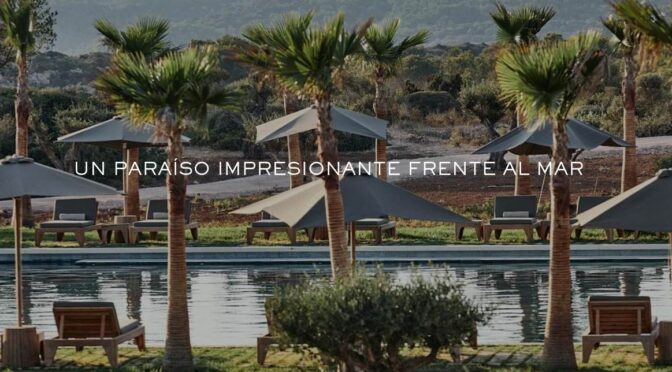Views: 1236
The GOB wishes to thank the joint action carried out by the Civil Guard and Water Resources to close an illegal well that extracted 40 tonnes of water daily at a rural hotel in Alaior. Ending the feeling of total impunity that has been observed in water abuse cases is essential for Menorca to have a future outlook on this issue.
High water consumption from swimming pools
It has already been revealed that the tourist accommodation using this illegal well was the one set up in the former Llucalari batteries. This is a case of a luxury establishment, which may help to reflect on the growing problem of water resources that Menorca is facing.
After more than 10 years of procedures and several versions of the tourism project, the number of places in this rural hotel was gradually reduced. From the 150 places planned in 2015, it later went down to 80. But in the end, the use of the buildings located on public land for accommodation was not authorised, and it ended up, under the rural hotel category, with a maximum of 30 places.
The site has a large swimming pool of almost 500 m² and about a dozen small pools of around 15 m².
The discovery of an undeclared well with daily extractions of 40,000 litres of water could indicate that the volumes of pool water renewed each day may be very high. The prices charged for a room in such an establishment are high. It is not unreasonable to think that the water in the small pools is changed almost daily.
The third establishment sanctioned in Alaior, with the same technical link
This is the third case of a rural tourist establishment in the municipality of Alaior to be sanctioned. First was the case of Torre Vella, where the GOB reported the presence of seven pools that were supposed to be water-saving cisterns.
The Town Hall did not allow the legalisation file to be consulted until it was resolved. The Avançam municipal group lodged an appeal against this legalisation, because at that time, the Island Territorial Plan already only allowed one swimming pool per rural hotel.
Then came Sant Llorenç. An establishment initially linked to the Llucalari batteries, which was eventually processed separately, but theoretically shares the same farming operation. At Sant Llorenç, the GOB also detected several pools that, in theory, were cisterns. The Planning Enforcement Consortium confirmed the existence of 9 pools without a licence. There is an open file on the case that the GOB is trying to consult.
Now it has emerged the use of an illegal well with large daily extractions. What do these spaces have in common, exploited by different promoters? In all three cases, the environmental processing was carried out by the consultancy Abril, whose owner has now been contracted by the Island Council of Menorca to draft the amendments to the Territorial Plan for rural land.
Pursuing the main consumers, a priority
The GOB encourages public institutions to work for the public interest. In Ciutadella there is also a case with 13 unlicensed pools. In Maó, there is a private lawn of 20,000 m², which consumes the equivalent of 800 residents. Next to the main road, there are large irrigation areas watering under full sun…
When water becomes a scarce resource, public bodies must protect the resident population. Anyone who uses large quantities of water on a whim or to make a business out of it must be investigated as a matter of priority..
Hopefully, this celebrated action will be the first of several more that will bring common sense to the waste of an element that is essential for the quality of life of residents and for the natural environment of the island.

